 I have reached a point in my life where I realize that any parent of an autistic child who claims to be at total peace with their familial situation must have a nose longer than Pinocchio’s. Or perhaps I am still a bit bipolar when it comes to this aspect of motherhood. For me, the highs and lows of raising a three-year-old with autism are extremely and inevitably taxing.
I have reached a point in my life where I realize that any parent of an autistic child who claims to be at total peace with their familial situation must have a nose longer than Pinocchio’s. Or perhaps I am still a bit bipolar when it comes to this aspect of motherhood. For me, the highs and lows of raising a three-year-old with autism are extremely and inevitably taxing.
At some moments, I feel like the Yellow Brick Road winding toward normalcy doesn’t seem all that long or bumpy. C. J. will say a new word, give an extra affectionate kiss before school, or sit like a devout little church mouse when the cake is being cut at a noisy, crowded birthday party. As a parent, it is such snapshots of your child’s life that prompt you to smile and to breathe an inward sigh of relief and fulfillment.
Hell, sometimes they even cause you to wonder if the doctor was right in the first place. How could a kid with autism possibly demonstrate such empathy and social propriety? Maybe the developmental pediatrician was simply having an off day of his own. If he could only see my baby now, he would scribble something else onto the clipboard, something that would steer my entire family’s life in a brighter, better course.
But then, almost as quickly as my emotions soar, my cockeyed optimism dips down, down, and away. In some instances, the impetus might be C. J. banging his fist against his head when he gets overly excited or frustrated. Or him shoving his little brother onto the floor because he inched a tad too close to the carefully constructed highway of Matchbox cars that coat our ottoman at least three times a week. I have one of those “you know your child is autistic when . . .” moments, and the slap of reality hits my heart as hard as it did the very first time I dragged my cursor over the online checklist of early warning signs.
It goes without saying that this teeter-totter of feelings and worries is directly linked to my fears about where the Yellow Brick Road will end—or if it will end. Will my child mature beyond the multitude of sensory issues that prevent him from boarding an elevator without becoming hysterical or touching shaving cream without acting like it’s scalding acid? Maybe he’ll grow up to be the next Mozart or Einstein. After all, there are rumors they were on the spectrum, right?
On the other hand, so was Dustin Hoffman’s character in Rain Man. Realistically speaking, this remarkably wide range of symptoms and levels of success in overcoming them are probably why autism is categorized as a spectrum disorder. Naturally, however, semantics aren’t exactly the silver-bullet solution to easing my concerns. Whether my child has Aspergers, classic autism, PDD-NOS, or whatever new category researchers throw into the New England Journal of Medicine, I am living with a very special little person who has very definite special needs. And, at least from my personal perspective, the thoughts that fly through my head on a daily basis span topics that stretch between estate planning and when C. J. will sit on the potty seat without leaping up as if it’s an electric chair.
Whereas his world is shaped by undeniably definitive structures, rules, and patterns, the rest of us seem swamped by uncertainties. That having been said, I have at last grasped that I am entitled to good days and bad days, highs and lows, swings and dips. In accepting C. J.’s autism, I have similarly embraced the innate schizophrenia that any parent of a special-needs child experiences as they roll along the Yellow Brick Road. To expect perfection of myself, my husband, and my other children in this particular situation is as pointless and unproductive as it is demanding it of him.
So, if I had to impart one of the most important lessons I’ve learned to date, it’s to be gentle with yourself. Let yourself have moments when you laugh at the foibles or sob uncontrollably over them as you see fit. They are, after all, no more than fleeting moments in your life together as a family.
And moments, unlike people, pass and fade away. As a person charged with caring for an autistic child, you will be no good to him unless you admit that you are just that—a person. Doubt, fear, elation, and acceptance will whip in and out of your existence, but you yourself will still be standing when the whirlwind dissipates. You have a God-given right to struggle with these extremes and to prove that, once every possible human emotion has washed over you, you remain a parent who is strong and honest enough to play multiple roles, including mother, advocate, teacher, psychologist, and part of the glue that’s holding your family together.
Leave a comment